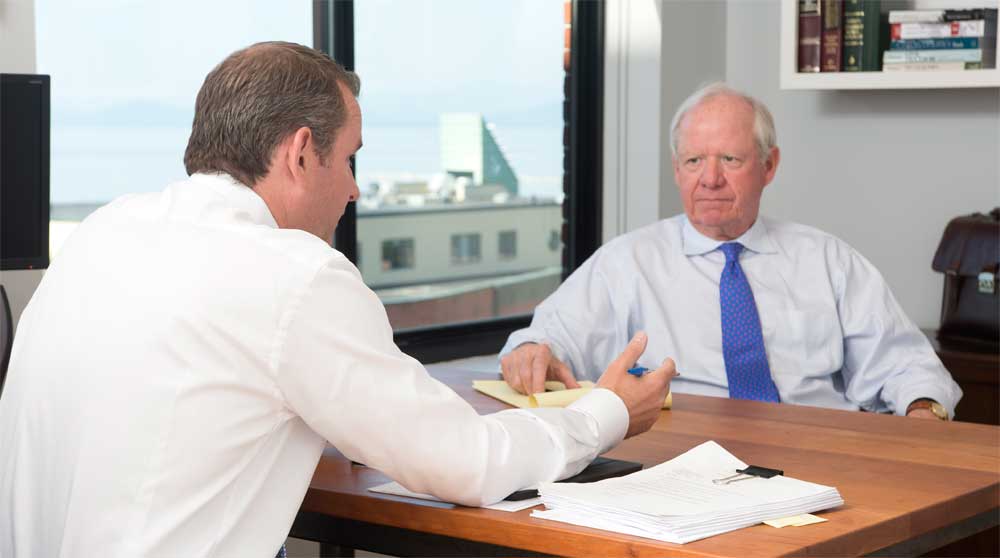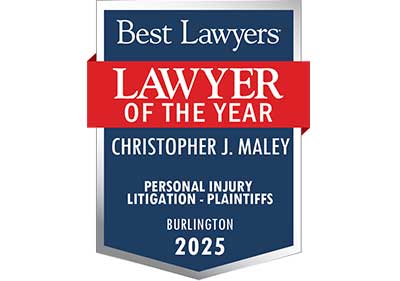Selected:
Lawyer of the Year
Personal Injury Litigation
Burlington - 2025
Vermont personal injury attorney Chris Maley has successfully represented plaintiffs in lawsuits involving automobile accidents, boating accidents, industrial and farming accidents, premises liability, construction accidents, skiing accidents, products liability, medical malpractice, and all manner of personal injury claims. Chris has negotiated many settlements in excess of one million dollars, and has also tried cases throughout Vermont.
He is selected as the "Lawyer of the Year" in Personal Injury Litigation in the 2025 edition of The Best Lawyers in America.
Vermont Personal Injury Lawyer

Ranked annually as a Tier 1 Burlington Vermont law firm for personal injury litigation by Best Law Firms, Maley and Maley, PLLC represents those who have been injured or killed throughout Vermont, as well as Vermont residents who have been injured or killed out of state.
If you or a family member have suffered a personal injury or wrongful death, we would be happy to speak with you. Please contact Chris by email or call collect at (802) 489-5258 for a free initial consultation and case evaluation.
Professional Referrals In the Area of Personal Injury
Maley and Maley receives many personal injury case referrals from other attorneys. The firm provides referral fees to referring attorneys within the statutes and ethical guidelines of their respective states, as well as those of Vermont.
Attorneys refer personal injury cases Maley and Maley for a variety of reasons, including cases in which the firm has a demonstrated history of success, matters that require extensive commitment of time and resources, or cases that present complex and unusual legal issues.
Maley and Maley can represent out-of-state residents who are injured in Vermont. If you are an attorney considering referring a potential case, please feel free to call (802) 489-5258 or contact Chris via email.
Vermont Law Pertaining To Personal Injury
If you are considering filing a lawsuit for personal injury in Vermont, or if you are a Vermont resident who may have a claim in Vermont arising out of an injury suffered elsewhere, you may find the following information educational and useful as you review your options relative to a potential lawsuit.
Negligence/Personal Injury Law
Generally, a personal injury action requires an injury sustained as a result of the failure of another person to exercise reasonable care under the circumstances.
Comparative Negligence
Under Vermont's comparative negligence statute the plaintiff may not recover damages if her negligence exceeds the negligence of the defendant. However, if the plaintiff's negligence is less than that of the defendant, the plaintiff's verdict will be reduced in proportion to the amount of negligence attributed to the plaintiff. 12 V.S.A. § 1036.
Motor Vehicle Injuries
The law governing personal injuries resulting from motor vehicle accidents can be found in Vermont's safety statutes (23 V.S.A. § 1031, et al.) and Vermont case law. Generally, drivers are required to exercise reasonable care under the circumstances in their operation of motor vehicles. Violation of Vermont's safety statutes constitutes a rebuttable presumption of negligence.
Statutes of Limitations
In order to preserve potential legal rights, contacting an attorney as soon as possible from the date of an injury or death is critical. All states have statutes of limitations which prohibit bringing old claims for personal injury or medical malpractice under certain circumstances. However, even if a person was injured some time ago, she may still be able to bring a claim despite these laws.
Generally, the statutes of limitations in Vermont require that personal injury and medical malpractice claims be brought within three years from the conduct giving rise to the claim, but there are significant exceptions to these laws. 12 V.S.A. § 512(4), 12 V.S.A. § 521, and 12 V.S.A. § 551. Consultation with an attorney regarding the nuances of the applicable statute of limitations is important. Generally, the time periods do not begin to run until the injured party has or should have discovered her injury and the fact that it may have been caused by defendant's negligence. 12 VSA 521.
Cases for wrongful death in Vermont must be brought within two years from the discovery of the death, subject to specific exceptions. 14 V.S.A. § 1492.
For cases relating to skiing the statute of limitations is only one year. 12 V.S.A. § 513.
If a plaintiff fails to file a lawsuit within the time periods set forth above or within any of the other applicable statute of limitations, then the right to bring a claim is barred and no recovery may be had. Therefore, speaking with an attorney as soon as possible is recommended if you believe you may have a right to compensation.
Potential Compensation
General Damages - Personal injury or medical malpractice claimants are entitled to compensation for pain and suffering, mental anguish, scarring, disfigurement, disability, permanent injury and loss of enjoyment of life caused by the negligence of another. They may also be entitled to compensation for lost wages, loss of earning capacity, and other out-of-pocket expenses. The spouse of an injured person may have a claim for loss of consortium that includes the loss of comfort, guidance, support, and affection. Medical bills are a recoverable piece of damages even if those bills are paid by insurance or by some other source.
Collateral Source Rule - In Vermont, payments received by the claimant from collateral sources may not be offered into evidence to reduce the claimant's recoverable damages. This means if medical bills or lost wages are covered by insurance, worker's compensation, Medicare or Medicaid, or any other collateral source, an injured party may still seek to recover the full damages. It is important to note, however, that the source that paid these medical bills or lost wages may have a lien or subrogation rights against the funds from a potential settlement or verdict for the amount they paid or a percentage thereof. The personal injury attorneys at Maley and Maley will assist with negotiating and resolving these liens and subrogation claims.
Damages For Future Harm and Expenses - So long as future damages such as pain and suffering, disability, loss of enjoyment of life, medical expenses, and lost wages are proven more likely than not to be incurred, those losses are recoverable as well.
Wrongful Death Damages - Wrongful death actions are lawsuits brought on behalf of a deceased person's next of kin for deaths caused by the negligent, reckless or intentional conduct of another. Vermont's wrongful death statute provides that the personal representative of the estate may be awarded for the benefit of the spouse and other specified relatives damages for "pecuniary injuries." 14 V.S.A. § 1492(b). Under Vermont law, "pecuniary injuries" are not limited to purely economic losses and may include recovery for loss of companionship, as well as a compensation for lost intellectual, moral and physical training, or the loss of care, nurture and protection. Clymer v. Webster, 156 Vt. 614, 629-630 (1991); Mobbs v. Central Vermont Ry, 150 Vt. 311, 316 (1988). In the case where an individual who died is a minor child special rules apply. In a wrongful death suit, the representative of the deceased may also bring a claim on behalf of the estate of the deceased for conscious pain and suffering sustained as a result of the defendant's conduct. 14 V.S.A §§ 1451, 1453 and 1492.
Punitive Damages - In rare instances, punitive damages may be recoverable in a personal injury or medical malpractice case. Punitive damages are not based on the severity of an injury. Rather, they are a way to punish a defendant for conduct that is particularly egregious under the circumstances. It is uncommon that punitive damages are awarded in personal injury or medical malpractice cases, but given an extremely culpable defendant such damages may be recoverable.
Vermont Injury Law: Discovery, Alternative Dispute Resolution, and Jury Trials
Discovery - In Vermont, the discovery schedule is ordinarily more expedited in the federal courts than in state courts. In federal court, within 30 days after the defendant has filed an answer, counsel must confer and jointly prepare and file a single, detailed schedule providing for completion of discovery no later than eight months after the last answer was filed. LR 26.1(b)(1). Detailed initial disclosures are required 14 days after the scheduling conference, unless otherwise agreed upon by counsel or ordered by the court. Fed. R. Civ. P. 26(a).In state court, the parties are required to file a Civil Case Flow Form stipulating to target dates for completion of discovery. Upon motion or court order, a discovery conference may be held to discuss the proposed plan, schedule, limitations and any other proposed orders with respect to discovery. A discovery order may enter, but also may be altered or amended whenever justice so requires. V.R.C.P. 26(f).
In both state and federal court all depositions, interrogatories, requests for documents, requests for admissions, answers to this discovery, notices of deposition, requests to permit entry upon land, expert disclosures and expert reports must not be filed unless required to support interlocutory motions or for use at trial. For these discovery documents, only a properly captioned certificate of service is required to be filed, unless the court orders otherwise. Fed.R.Civ.P. 5(d) and V.R.C.P. 5(d).
Court Mandated Alternative Dispute Resolution - In Vermont federal courts, after an opportunity for limited discovery, the parties, their lawyers, and representatives from insurance companies covering the defendant must meet with a neutral evaluator who is knowledgeable in the subject matter of the litigation to discuss all aspects of the case. The purpose of the Early Neutral Evaluation (ENE) is to reduce the cost and duration of litigation by providing an early opportunity for realistic settlement negotiations or to narrow the issues in dispute. LR 16.3.
In state court, a similar process for alternative dispute resolution is required, but it may take the form of mediation, ENE, binding arbitration or any other method involving a neutral and agreed upon by the parties. V.R.C.P. 16.3.
Vermont Juries - When selecting a jury in Vermont federal court, each side will generally have three peremptory challenges. Upon motion, the Court may allow additional challenges. Typically, twenty-one prospective jurors will be called. The voir dire process usually begins with brief statements from counsel outlining the facts that they intend to prove at trial and is followed by the court conducting voir dire to all twenty-one jurors. Next, counsel shall conduct a brief voir dire, but attorneys are not permitted to argue, or ask questions which have the exclusive purpose of educating the jury as to their position. Counsel address challenges from among all of the twenty-one jurors. Until the final jury is chosen, the jurors will not change seats or numbers, unless it becomes necessary to use additional jurors in the selection process. If a challenge is passed it is lost, unless it is used for a potential juror called after the initial twenty-one.
In state court, the attorneys conduct the voir dire to eighteen or more prospective jurors depending upon the judge's preference. The court may ask additional questions, or, upon agreement of the parties may conduct the examination. The lawyers are under similar restrictions against argument as in federal court. Each party is permitted six peremptory challenges. The plaintiff exercises the first challenge and then each peremptory challenge is made alternatively by the parties. The court may direct that not more than two alternative jurors sit in a given case. V.R.C.P. 47.
In either Vermont state or federal court, the parties may stipulate that the jury shall consist of any number less than twelve or that a verdict of a majority of jurors shall be taken as the verdict. V.R.C.P. 48 and Fed.R.Civ.P. 48.
Judges have the option of permitting juries to take notes in civil cases.
Helpful Resources
- U.S. Consumer Product and Safety Council - www.cpsc.gov
- American National Standards Institute: www.ansi.org


